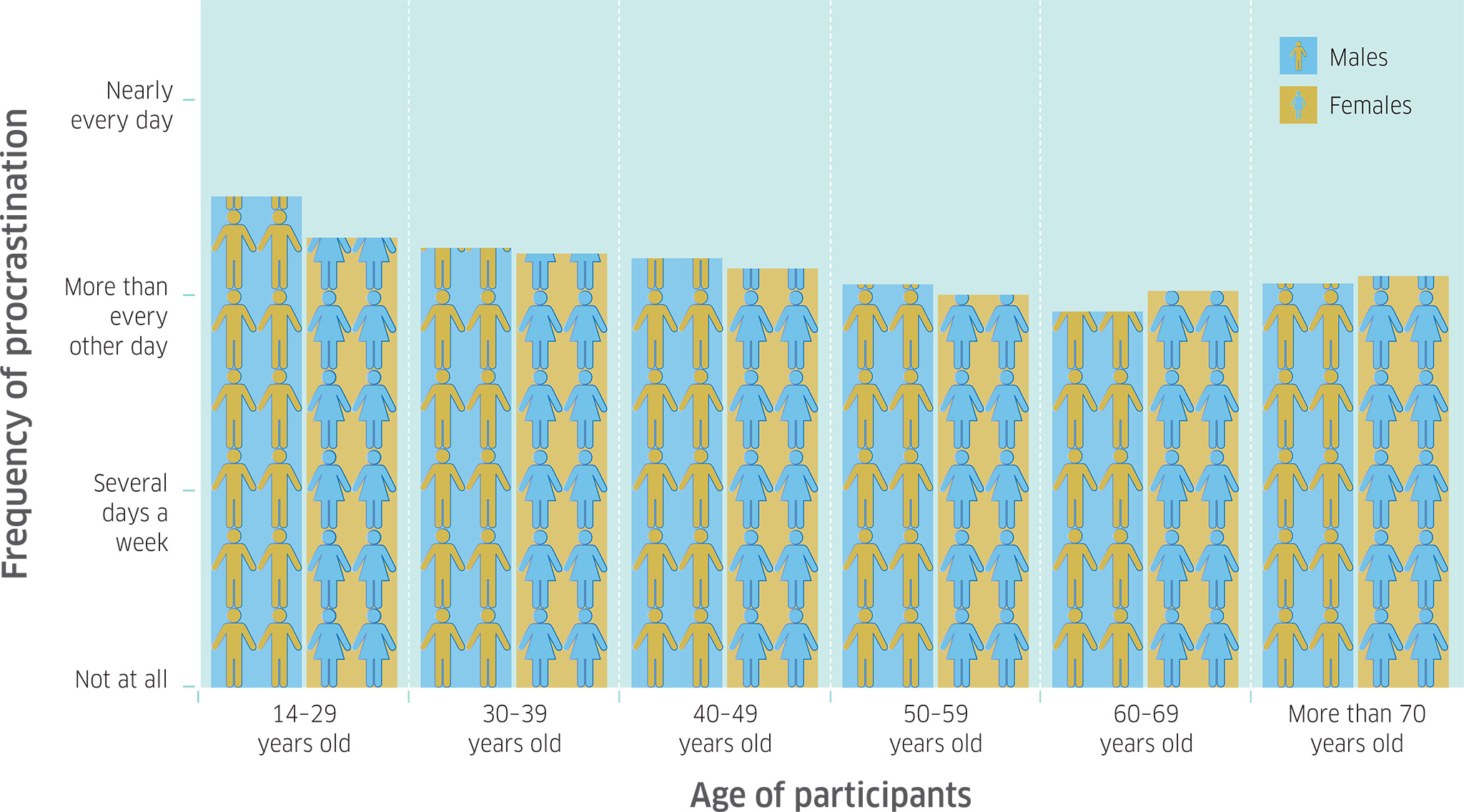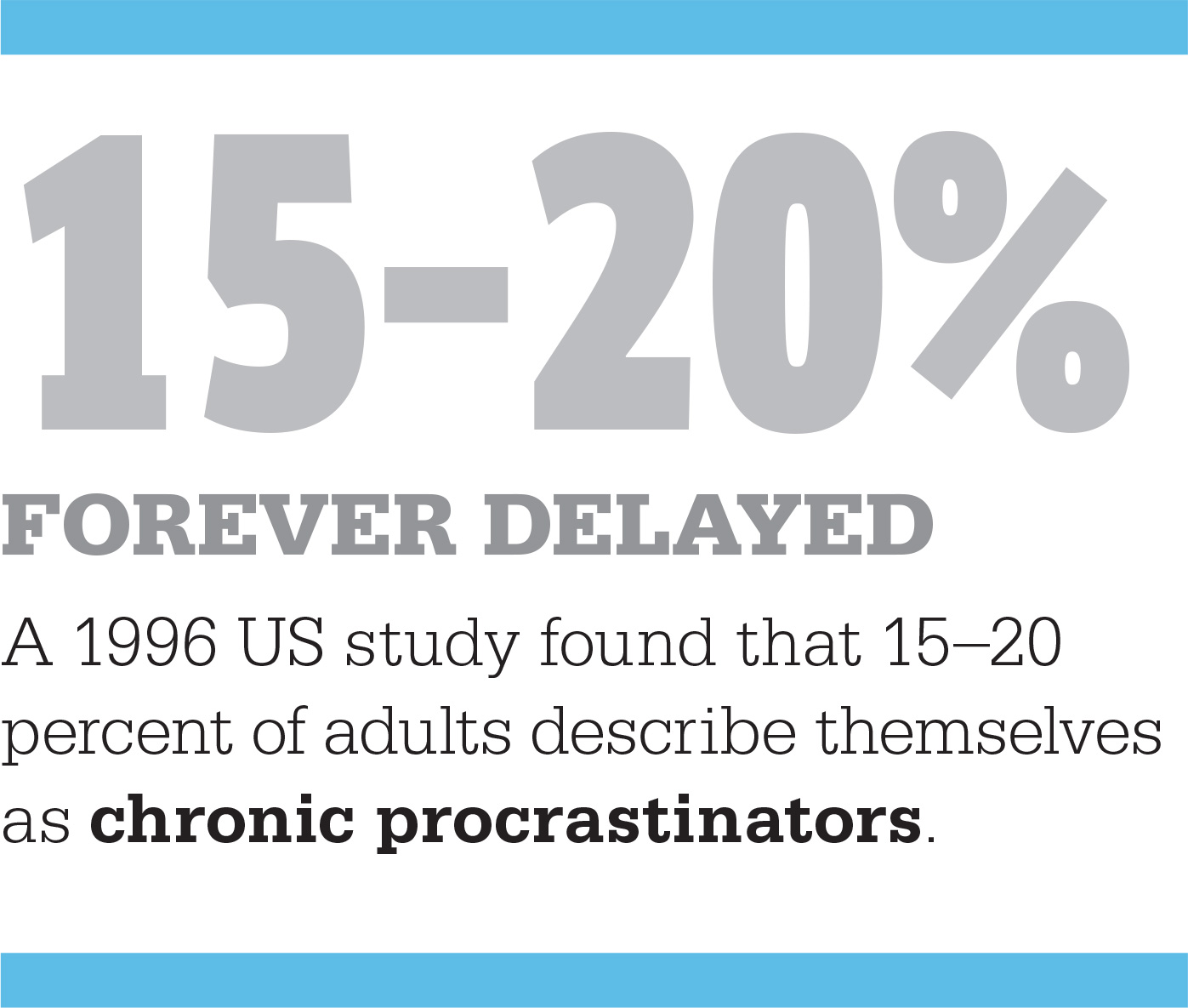
If you’ve ever thought, “I know I have to do it, but I’ll just do one more thing first …,” then you’re familiar with procrastination. It’s time to stop delaying and get down to business. Here’s how to do it.
Most of us realize it’s a bad idea to put things off. Indeed, studies confirm that procrastination can lead to worse academic performance; less self-care; poorer health; worse employment records; higher levels of stress, anxiety, and depression; and even increased loneliness. Given these negative effects, you might think we would be motivated to avoid procrastination at all costs. However, feeling bad about yourself is likely to make you procrastinate more, not less. A better strategy is to tackle the practical causes of procrastination.
Why do we do it?
Psychology defines procrastination as a “self-regulatory failure,” which means that we find ourselves unable to manage our own behavior, even when we know we should. The true nature of this behavior is clear from the word’s Latin origins: “pro,” meaning “put forward,” and “crastinus,” meaning tomorrow. Its causes are complex and still being studied, but various factors contributing to procrastination are known, and are as follows:
- Some of it is innate. A 2003 twin study, for example, found that about 22 percent of the cause was likely to be genetic.
- The appeal of a task plays a big factor. This is known as “task aversion”: the more aversive or unpleasant something is, the more likely we are to put it off.
- On the Big Five personality test, people who rate high for neuroticism and/or low for conscientiousness tend to procrastinate more.
- Perfectionism, fear of failure, and anxiety about being judged all correlate with procrastination. This suggests that some of us delay because the stress of a task not done is less frightening than the stress of doing it and being found inadequate.
- Impulsiveness goes hand in hand with procrastination. If we struggle to control our passing desires, the desire to do something more fun than the task at hand is overwhelming.
- We can “self-handicap.” People who believe their actions don’t have much power to change things are likely to focus on trying to manage their feelings about a situation instead of acting to try and change it.
- Just as procrastination can lead to depression, so people prone to depression procrastinate more—largely because depression saps our energy.

 Doubts Getting You Down?
Doubts Getting You Down?
If you’re delaying getting started on something because you don’t feel up to the task, try a technique discovered in a 2010 study published in the Journal of Experimental Social Psychology. The researchers found that uncertain people found themselves feeling more confident if, when they expressed their doubts, they shook their heads at the same time, as if disagreeing with their own words. If you make your gestures “doubt your doubts,” your mood may follow.
The Procrastination Cycle
When we tell ourselves we’ll do something later, we’re hoping that we’ll feel more motivated when the time comes. The trouble is, the stress of leaving tasks undone tends to create a negative cycle. If you think you’ll feel more like doing something tomorrow, you’re probably wrong, so you might as well start now.

What can you do about it?
If you tend to put things off, what’s the solution? The first thing to realize is that false logic has a role to play in procrastination. According to American psychologist Joseph Ferrari, we are subject to two false assumptions:
1 We delay taking action because we feel we’re in the “wrong mood.”
2 We assume that (somehow) our mood will spontaneously improve in the near future.
In fact, our mood for doing the task is only likely to grow less favorable the more we put it off (see “The procrastination cycle,”), as guilt makes us less productive. More effective methods include:
- Get someone else to set you a deadline. A study by Israeli-American psychologist Dan Ariely found that, given three passages of text to proofread, students with external deadlines consistently outperformed those who were allowed to manage their own time—especially when they were given a single end date for all three passages, as this added a further level of constraint to the deadline. Set a deadline and share it with someone to hold yourself accountable.
- Trick yourself. A study by Ferrari found that students who put off a “cognitive evaluation” puzzle did this exact same puzzle just as readily as everyone else when they were told it was a game. You can do this particularly well if you use the technique of “impulse pairing” or “fusing.” This means you blend a necessary task with the kind of fun task that you might otherwise be tempted to do instead—for instance, if you avoid studying to socialize, create a study group so you can do both at once.
- Limit your distractions. If you just can’t do your tax return when you could browse the internet instead, put a temporary blocker on your computer or phone. If you know you always end up doing housework instead of studying for that examination, go somewhere else, such as a library, to focus your attention.
- Find the challenge. A 1995 US study observed that difficulty isn’t as much of a deterrent as we might think. In fact, tasks that are too easy are boring, and boredom is off-putting. We find it more satisfying to do something that feels like an achievement, so if something is simple but necessary, try to add a level of challenge to it so that it feels more meaningful.
- Find your role models. A 1997 study by American psychologist Albert Bandura found there were two particularly effective ways of making a task more achievable. The first is “modeling,” or learning by example, because it helps to observe other people completing tasks. The second method, “performance accomplishments,” involves knowing your own track record of success and reminding yourself that you’ve finished things in the past. Even if they’re small things, make a note of them so you can see yourself as a finisher, not a delayer.
- Remember you’re a learner. Psychologists talk of “learned industriousness,” meaning that you can teach yourself good habits. The way to do this is to give yourself rewards, which don’t have to be substantial—
a 2000 study published in the Journal of Applied Behavior Analysis found that pennies and praise did the job. The important point about the rewards is that they must meet two criteria. First, they must be reliable, so don’t skip rewarding yourself. Second, they have to come immediately after you have completed the task—after all, your brain is primarily focused on the short term.
All of us are guilty of the occasional delay, but for some of us it’s a more serious problem. The best solution is not to feel ashamed, as this will only increase your stress levels, and research shows that the more stressed we feel about a task, the less likely we are to get started. Instead, try to see each task as a challenge that will make you feel good when you finish it. Even a moderately efficient working pattern can lead to substantial success.
 concrete thinking
concrete thinking
A 2008 study published in Psychological Science found that people are more efficient when they think in practical terms. Participants were split into two groups:

They were then asked to complete a survey and return it within three weeks. The “abstract construal” group took an average of 20.5 days to complete it—right up to the deadline—while the “concrete construal” group averaged 12.5 days. Just being encouraged to think in specific terms shortened the response time.
Growing Out of It?
Who procrastinates the most? According to a 2015 German study, people who are 14–29 years old score highest, but the numbers don’t fall substantially with increased maturity. If you’re young now, you’d be well advised to start improving your habits right away, as good timekeeping doesn’t develop automatically.



